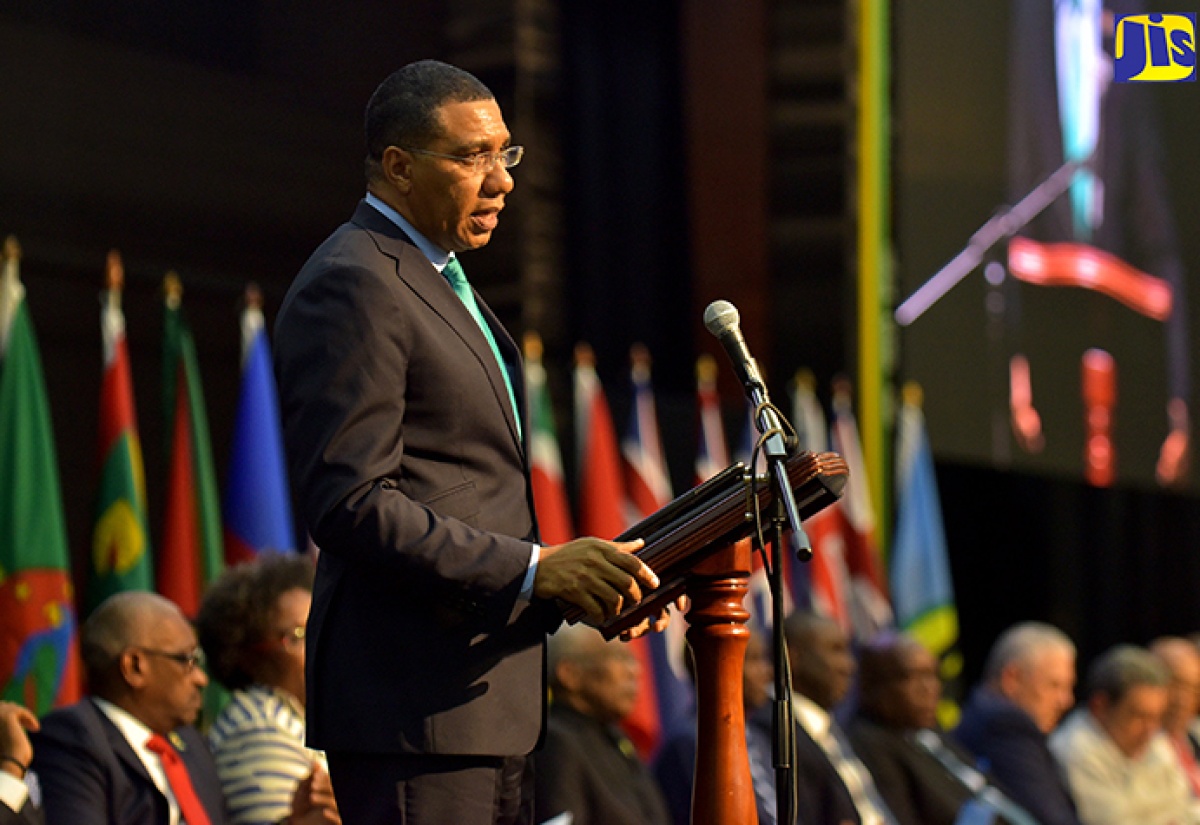Regional Leaders Commit to A More Effective CSME
By: , July 6, 2018The Key Point:
The Facts
- At least three leaders spoke of their commitment as they addressed the opening ceremony for the 39th Regular Meeting of the Conference of Heads of Government of CARICOM on Wednesday, July 4, at the Montego Bay Convention Centre, in St. James.
- Prime Minister of Jamaica and CARICOM Chairman, the Most Hon. Andrew Holness, said his leadership of the Community will call for member states to take decisive actions to transform the CSME into a facility that will truly serve the interest of Caribbean people.
The Full Story
Regional leaders are committed to making the CARICOM Single Market and Economy (CSME) more effective.
At least three leaders spoke of their commitment as they addressed the opening ceremony for the 39th Regular Meeting of the Conference of Heads of Government of CARICOM on Wednesday, July 4, at the Montego Bay Convention Centre, in St. James.
The ceremony was held on CARICOM Day, which marked the 45th anniversary of the establishment of the regional body.
Prime Minister of Jamaica and CARICOM Chairman, the Most Hon. Andrew Holness, said his leadership of the Community will call for member states to take decisive actions to transform the CSME into a facility that will truly serve the interest of Caribbean people.
“We will call upon all member states to summon the necessary political will and determination to ensure that programmes and initiatives are strategically focused and geared towards meeting an ambitious process of reform,” the Prime Minister said.
He pointed out that despite the fact that the CSME is the single most significant initiative of the regional states since 2003, “progress has not been commensurate with our aspirations”.
Mr. Holness reiterated the position taken by the Jamaican Parliament in a recent Resolution that speaks to the need for a re-evaluation of the integration process, and for member states to commit to implementing a fully functional single market within a five-year period.
“This 45-year milestone represents an opportune time to evaluate our institutions as we look towards commemoration of our 50th anniversary. We owe it to the people of our region to deliver on commitments made to an effective process of regional integration that will improve the quality of their lives,” the Prime Minister said.
The Parliamentary Resolution covered, among other things, the need for CARICOM member states to make a clear commitment to establishing the single market with a “specific time-bound, measurable and verifiable programme of actions to fulfil all outstanding obligations within a period of five years”.
In the meantime, CARICOM Secretary-General, Ambassador Irwin LaRocque, conceded that more should have been achieved, even as he pointed to the accomplishments of the CSME since it was established in Jamaica 12 years ago.
“Major policy decisions and adoption of legal instruments take much too long to be negotiated. We must do more and do it more quickly,” he urged.
Ambassador LaRocque underscored that the success of the CSME is being judged by the public on the basis of implementation of the measures agreed that allow citizens and businesses to benefit.
The Meeting has included a Special Session on the CSME to examine ways to improve effectiveness, and the Secretary-General said participants have indicated that the single market “remains the most viable option and platform to enable the Community and its nationals to achieve their goals of sustainable growth and development”.
In his address, Prime Minister of Antigua and Barbuda, Gaston Browne, posited that the CSME must be at the heart of the process of regional integration, and called for a move beyond functional cooperation.
“Each of our countries has to commit to, and implement, free movement of goods, people, services, capital and technology. It is the only way in which our region will overcome the low level of both intra-industry and intra-regional trade,” Prime Minister Browne said.
He expressed optimism that the newly installed Prime Minister of Barbados, Mia Mottley, will excel in her role as regional head, with responsibility for the CSME.
Prime Minister Mottley, in her remarks, pointed to “psychological impediments and the closed mindsets in some quarters of officialdom” as some reasons for the under-achievement of the CSME.
She explained that because the practical implications of decisions sometimes are not worked out beforehand, and the recording of the decisions often are not clear and precise, “these (decisions) fall victim to bureaucratic inertia or resistance from those who did not participate meaningfully in their design or have not been fully enlightened as to their positive purpose”.
Describing the Golding Commission Report on Jamaica’s relations with CARICOM and CARIFORUM as “frank and sobering”, she acknowledged the need for the regional Heads to continue self-analysis and introspection.
The Golding Commission evaluated the effects that Jamaica’s participation in CARICOM has on its economic development; CARICOM’s achievements against the goals set out in the revised Treaty of Chaguaramas; and the value of Jamaica’s membership in CARICOM and its influence on the international scene.


